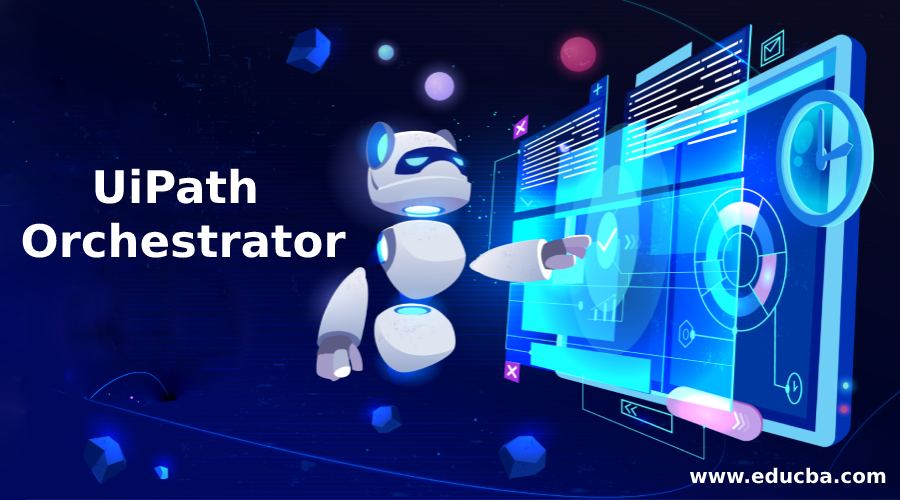Updated March 30, 2023

Introduction to UiPath Orchestrator
UiPath Orchestrator can be defined as a web application where people or end users can deploy their robots, monitor the health of the robots, manage their functioning, and keep a log of tasks the robots perform. Orchestrator is a centralized application for deploying a robot, managing its functionality, monitoring the tasks it is undertaking, and logging the reports in storage.
At one time, one can deploy one robot or many. The same can be said about the management and maintenance of robots. Besides the ease of deployment, it ensures smooth management, scheduling of processes, and logging of records. As an additional feature, one can limit access to robots for team members on the basis of their roles, for e.g., a developer can mend the robots but the support team only has access to monitor the run.
Advantages & Uses of UiPath Orchestrator
Some of the advantages and primary uses of UiPath Orchestrator are as follows:
- Deployment: One can deploy their robots on this platform once they are created and developed completely.
- Scheduling: One can schedule when and how the robot must run and what and all should be logged.
- Management: If a developer deploys numerous robots on the portal, the Orchestrator offers multiple features for the management of these robots.
- Maintenance: It is a very useful feature. Once developers have deployed their robots, they can manage and maintain these robots using the Orchestrator.
- Monitoring: One can monitor the real-time run of the robots using UiPath Orchestrator and see how the robot executes each process defined by the developer.
Let us go ahead and take a look at the main advantages of UiPath Orchestrator:
- Checks the Performance of the Robot: The concept of a robot’s heartbeat is unique to the Orchestrator. Here the robots which are running fine or are in good health, send constant heartbeats (or signals) to the central server. Once the heartbeats become less frequent, the server is alerted for the declining health of the robot and thereby alerts the developer/manager too.
- Common and Shared Assets: The robots are designed in such a way that they need some resources to execute the tasks defined by the developers. These resources are called assets. They are re-usable and stored within the Orchestrator. They are provided to the robots whenever needed.
- Exception is Handled Smartly: If there occurs any exception in the process run of the robot, it doesn’t immediately send out a notification. The Orchestrator makes the robot attempt the task one more time as a precautionary check. If it functions properly in the second run, the schedule remains as is. If it still encounters the exception, an alert is sent out to the developer to check the issue.
- Choice Amongst Multiple Clouds: There are various choices for clouds offered by the Orchestrator. It can be either on one’s personal cloud or the cloud offered by the Orchestrator.
- Remote Monitoring: A developer can easily monitor the robots from anywhere using their cell phones.
Capabilities of UiPath Orchestrator
Let us now have a look at some of the key capabilities of the Orchestrator and use it in a better way:
- Provisioning: UiPath Orchestrator makes sure that the web portal and the robot deployed, is always connected. This way, the developer has ease of access even while working remotely.
- Configuration: The Orchestrator makes available the required environment and also makes sure that configurations are all in place. These can be customized by the user and will be maintained by the Orchestrator.
- Deployment: Developers can deploy easily when Orchestrator is involved. It makes available the correct packages and offers version control of the same. Post-deployment also, Orchestrator is active and checks the functioning of the robots.
- Monitoring: The Orchestrator provides the facility of constant monitoring of the robots. The robots are checked through their heartbeat. In case of emergencies, the owners are notified.
- Queues: The Orchestrator manages and controls the work distributions among the robots, and keeps a check on the performance as well.
- Logging: Report logging is also a special feature offered. The logging platform can be an SQL database of another platform, based on the choice and configurations, but the log reports are maintained on a regular basis.
- Inter-connectivity: As many robots are required to connect to various third-party applications, the Orchestrator ensures smooth connectivity to each of the applications as and when required.
Conclusion
The article described the major use of UiPath Orchestrator while creating a robot for the purpose of automation. A developer who is interested in robotic process automation can learn UiPath and try all the facilities offered by the Orchestrator. Also, if one is well versed with automation techniques, it will open various doors as far as the employment perspective is concerned. Hence, learning robotic process automation can be put on the priority list, without a second thought.
Recommended Articles
This is a guide to UiPath Orchestrator. Here we discuss the introduction to UiPath Orchestrator and its main capabilities along with its advantages. You can also go through our other suggested articles to learn more –


